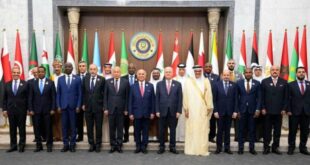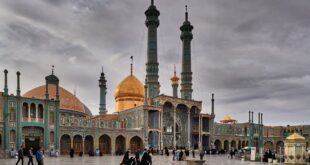HIZBOLLAH FOUGHT FIERCE battles with Israeli troops on the Lebanese border Thursday, as thousands more foreigners fled the nine-day-old war in Lebanon, including 1,000 Americans evacuated by US Marines.
Al Jazeera television said four Israelis had been killed. An Israeli military source said there had been Israeli casualties but gave no details. Israeli media reported eight soldiers wounded. Hizbollah said one of its fighters was killed. The firefight took place just inside Lebanon, near an area where Hizbollah fighters killed two Israeli soldiers and wounded nine in Lebanon on Wednesday. Earlier on Thursday three Israeli soldiers were wounded, two of them seriously, in clashes in the area. The Israeli army said two Hizbollah fighters were killed in that battle. Hizbollah said it had destroyed two Israeli tanks in house to house fighting in the village of Maroun Ras. The group’s Manar television showed captured Israeli equipment, including a rifle, night-vision binoculars, grenades and a video camera.
Elite Israeli troops have launched small raids inside Lebanon in recent days to try to destroy Hizbollah positions and stop fighters firing rockets into the Jewish state.
Israel, which is also waging a three-week military campaign in Gaza, launched its offensive after Hizbollah captured two soldiers and killed eight in a cross-border raid on July 12.
Its bombardment has killed at least 311 people in Lebanon, mainly civilians, and displaced hundreds of thousands. At least 29 Israeli soldiers and civilians have been killed.
The United States, which has exerted no public pressure on Israel for a ceasefire, said Secretary of State Condoleezza Rice may travel to the Middle East next week to press for a political solution to reduce fighting.
Annan plea
UN Secretary General Kofi Annan called for an immediate end to hostilities, but said a team he had sent to the region believed a sustainable ceasefire would take time to arrange.
He told the Security Council a quick end to the fighting would allow aid workers to reach those in need and would “give diplomacy the chance to work out a practical package of actions that would provide a lasting solution to the current crisis”.
A tiny US Marine force landed in Lebanon to evacuate about 1,000 Americans stranded with thousands of other foreigners.
It was the US military’s first return to Lebanon since it withdrew in 1984, months after a Shiite Muslim suicide bomber destroyed a Marine barracks killing 241 US service personnel.
There was no sign Israel or Hizbollah was ready to heed the Beirut government’s pleas for an immediate halt to the war, despite UN, French and Russian backing for a ceasefire.
Israel’s Defence Minister Amir Peretz raised the possibility of a ground offensive into Lebanon, something senior generals have also repeatedly said they do not rule out.
The border clashes have shown the group is still moving relatively freely near the hilly frontier despite a week of heavy artillery barrages from the Jewish state.
Israel told Germany it would welcome any help Berlin could give in trying to free the two soldiers held by Hizbollah, but it also reiterated its rejection of Hizbollah’s proposal for a prisoner swap similar to one mediated by Germany in 2004.
About 40 Marines arrived on a beach in a Christian area north of Beirut at dawn to ferry about 1,200 Americans to Cyprus as part of efforts to extract US citizens caught in a war zone like thousands of other foreigners, many of Lebanese origin.
“We are thankful to leave but our hearts and prayers are with Lebanon and its people,” said evacuee Mireille Ayoub, 47, from Los Angeles. “It’s very bad there, unsafe and uncertain.”
France arranged for some 550 French and other European nationals to embark from the battered southern port of Tyre.
Israel, which has imposed a sea and air blockade of Lebanon and bombed the main road to neighbouring Syria, said it would let aid into Lebanon to ease the growing threat of a humanitarian crisis. It was not clear how the aid could reach worst-hit areas in the south where roads and bridges have all been targeted.
Israel’s offensive in Lebanon has coincided with a major push into the Gaza Strip to retrieve another soldier, seized by Palestinian fighters on June 25 and stop cross-border rocket fire.
Leadership remains intact
Hizbollah leader Sheikh Hassan Nasrallah said Thursday the group’s leadership remains intact, appearing an interview on Al Jazeera a day after Israel said it bombed a bunker where he may have been hiding.
Nasrallah vowed never to release two Israeli soldiers captured by his fighters even if “if the whole universe comes [against us],†saying they would only be freed as part of a prisoner exchange brokered through indirect negotiations.
Hizbollah immediately denied there was any bunker and that none of its members was hurt. It said the strike hit a mosque under construction.
“I can confirm without exaggerating or using psychological warfare, that we have not been harmed,†he said, referring to the strike.
Al Jazeera, which aired only excerpts of the interview, said it was taped earlier Thursday. The interviewer said the interview took place amid tight security precautions but did not say where.
Nasrallah also denied claims by Israel to have destroyed half of Hizbollah’s rocket arsenal, calling the claims “baselessâ€.
“Hizbollah has so far stood fast, absorbed the strike and has retaken the initiative and made the surprises that it had promised, and there are more surprises,†he said, warning that a Hizbollah defeat would be “a defeat for the entire Islamic nationâ€.
 Eurasia Press & News
Eurasia Press & News



